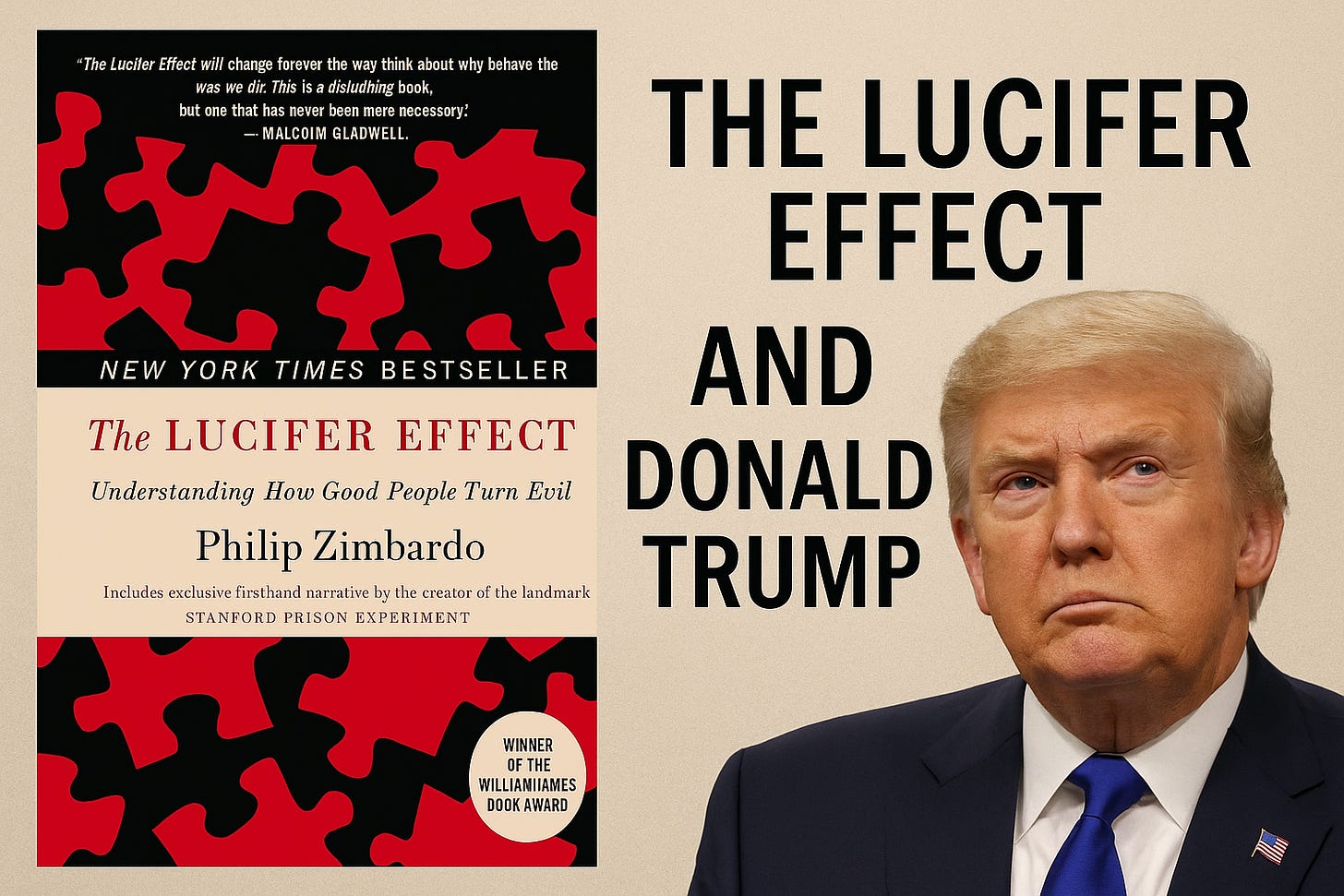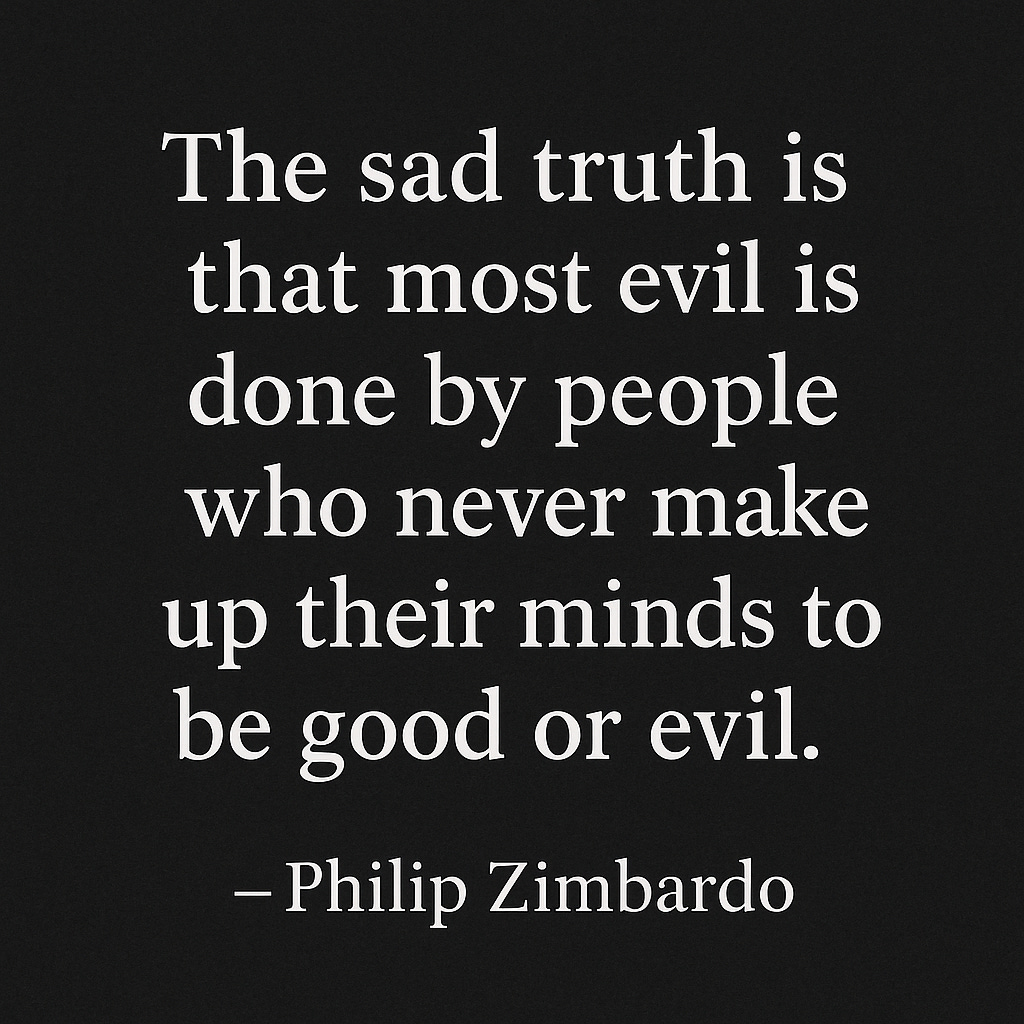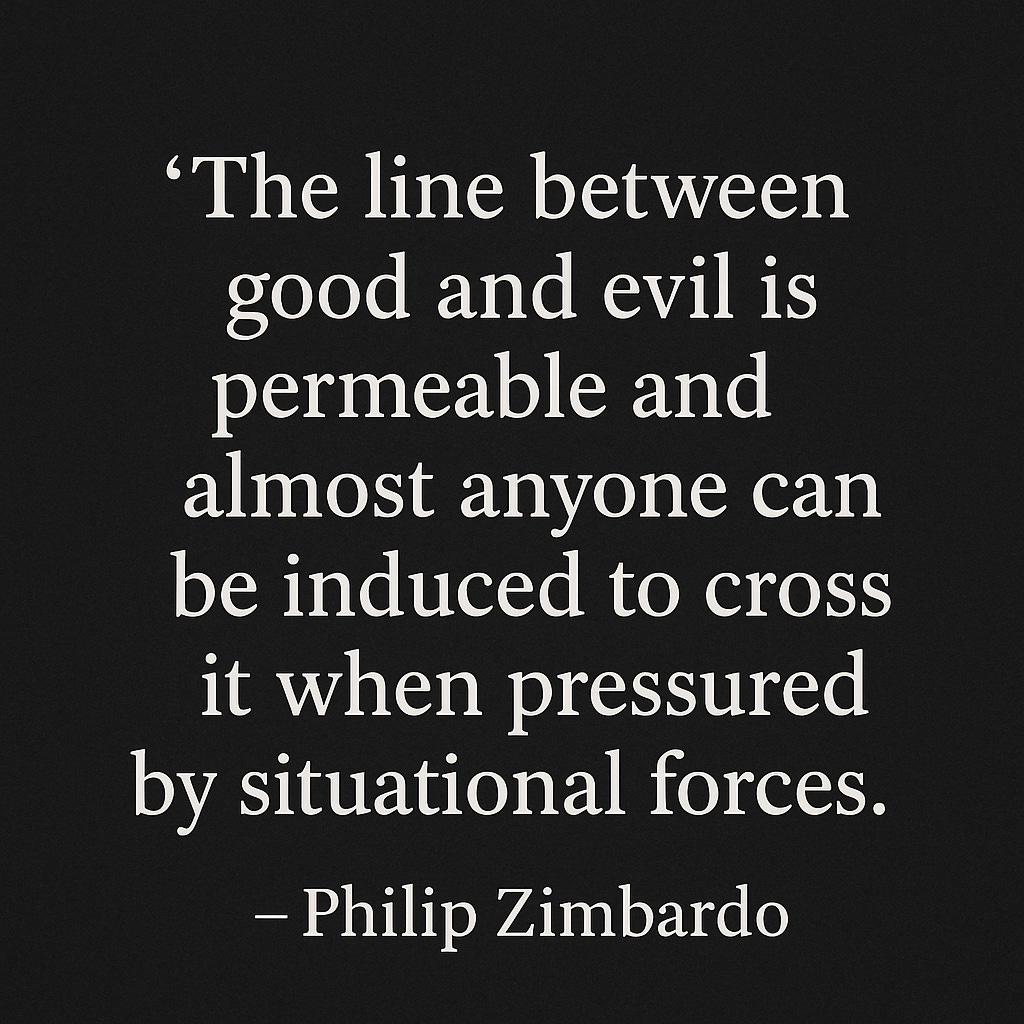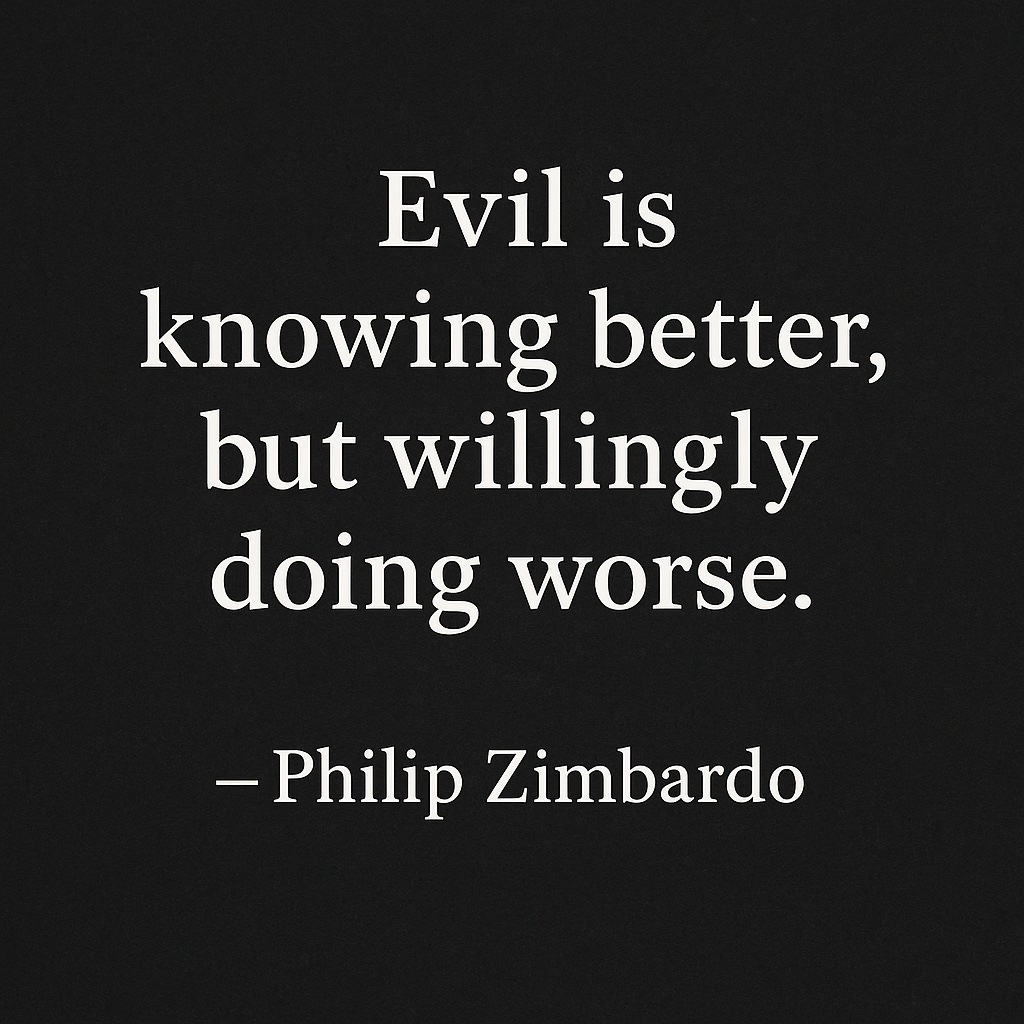The Lucifer Effect: The Stanford Prison Experiment Was a Warning. We Ignored It.
Christine Merser, August 1, 2025
When I first read The Lucifer Effect: Understanding How Good People Turn Evil by Philip Zimbardo, of course I thought about Hitler. That’s where your mind goes when you’re faced with a book that asks how good people cross the line into cruelty. I read it as a cautionary tale about the past. I didn’t think, thank God I don’t have to worry about this. I didn’t think about it at all in terms of the present. It wasn’t on my radar. It didn’t feel urgent. It felt like history.
It never occurred to me that less than twenty years later, I’d be standing in the wreckage of my country, watching a man more powerful and more cruel than Hitler at center stage in the United States of America.
Zimbardo built the book around the Stanford Prison Experiment, which he ran in the basement of Stanford University in 1971. Two dozen college kids were split into guards and prisoners. They were given uniforms, rules, and roles to play. The experiment was supposed to last two weeks. It collapsed in six days. The guards got mean, then they got violent. The power shifted something in them. The performance became real. Zimbardo shut it down when it stopped being a simulation and started becoming something much more dangerous. His conclusion was simple and chilling. People are not inherently evil. But put them in the wrong situation, give them power without oversight, strip away accountability and identity, and they’ll often become something they never thought they could. Evil, Zimbardo said, is situational. That’s the Lucifer Effect.
If it sounds abstract, it isn’t. Just look at Abu Ghraib. In 2003, American soldiers — not monsters, not sadists, just regular people in uniform — tortured and humiliated detainees in an Iraqi prison. They stripped men naked, piled them into pyramids, forced them into degrading poses, and laughed while doing it. The photos went around the world. The cruelty was undeniable. And the question was the same one Zimbardo asked. How do good people become the face of evil? He even testified at the trials, warning that it wasn’t just about a few bad apples. It was about the barrel. The environment. The power structure. Put good people in the wrong place, give them unchecked authority, and the Lucifer Effect does the rest.
But there’s something Zimbardo didn’t really get into. He studied how people change. He didn’t study the people who never had to. The ones who didn’t need to be corrupted, because they were already waiting for a stage. He focused on the guards. He didn’t look too closely at the man who would’ve volunteered to run the whole prison, not as part of the experiment, but because he liked it.
Zimbardo didn’t spend much time on the kind of person who didn’t need to be pushed to cross the line. The kind of person who didn’t need a uniform or a script to justify cruelty. Someone who didn’t fall into darkness, but walked in without blinking. I don’t think Zimbardo had someone like Trump in mind. But that’s who we got. Not someone who changed under pressure, but someone for whom we have no evidence, none, that he was ever anything other than what we see now. Not one public moment of kindness. Not one act of grace. Not one time where he chose decency over domination. And more than that, no one has ever come forward to say otherwise. No former friend. No family member. No colleague. No ghostwriter. No teacher. No staffer. No one has ever said, there was a time when Donald Trump was different. The silence around that question tells its own story. Maybe he wasn’t always this way. Maybe something in him hardened long ago. But if there was ever a different version of Donald Trump, not one person has seen fit to defend it.
Trump didn’t fall. He didn’t change. He didn’t become corrupted by power. He arrived as himself. The system didn’t transform him. It simply made space for him. There was no moment when he shifted. What we saw on day one is exactly what we still see now. Loud. Angry. Self-obsessed. Addicted to dominance. Utterly indifferent to truth. Utterly incapable of empathy. Zimbardo studied how ordinary people could be pulled toward evil by the circumstances around them. But Trump doesn’t fit that model. He didn’t slip. He didn’t evolve. He didn’t need the environment to bring something dark out of him. The darkness was already there. The environment simply stopped trying to contain it.
And what makes him more dangerous than any world leader in my lifetime is that he does something Zimbardo doesn’t really talk about. He goes out of his way to execute his policies with a cruelty that is unnecessary to the final result. He doesn’t just deport immigrants. He doesn’t return them to their home countries, where they might have a chance. He sends them to living hells. To El Salvador. To Syria. To places where they will almost certainly suffer or die. There’s no reason for that. Not legal. Not strategic. Not practical. It is, plain and simple, cruelty for its own sake. It’s an exertion of power so extreme that it stops being about law or policy and becomes something closer to sadism. And that’s not something Zimbardo addressed. Because he wasn’t studying people who make the rules. He was studying people who follow them. Trump is not a follower. He’s not someone who breaks under pressure. He’s someone who pressures others to break. That’s a different kind of danger.
But the people around him do fit the model. They were the ones Zimbardo was talking about. The ones who started with lines they said they would never cross, and crossed them anyway. Giuliani. Barr. Graham. Haley. People who once had reputations, boundaries, guiding principles, however shallow — and abandoned them to stay in his orbit. They weren’t born to it. They were drawn in, reshaped by the power structure, rewarded for obedience, and punished for truth. They didn’t have to fall. They chose to.
Zimbardo didn’t just give us a diagnosis. He gave us a remedy. He called it the heroic imagination — the ability to see yourself not as a bystander, not as someone who waits it out, not as someone who shrugs and says it’s out of their hands — but as someone who intervenes. Someone who resists early, speaks up clearly, and refuses to become a guard just because they were handed a uniform. If the Lucifer Effect shows how good people get pulled into evil, then the answer has to be reminding them they can walk away. That’s what this letter is. Not a sermon. Not a threat. A reminder. A door still open.
So here’s what I’m doing. I’m writing a letter. It’s not for Trump. We don’t know how he got here, and we don’t know if he’s gone. This is for the people still standing next to him. The ones with names and titles and Twitter accounts and staff and secret service protection and legacy aspirations. The ones who know better. The ones who still might stop. And I’m asking everyone who reads this to send it to them.
Or better yet, send the book to their families.
⸻
Dear Enabler,
There’s a book I hope you’ve read. It’s called The Lucifer Effect: Understanding How Good People Turn Evil by Philip Zimbardo. It’s not about monsters. It’s about people like you. People who start out with boundaries, with principles, with a sense of self. And then, slowly, they begin to shift. They’re handed power. They’re told to play a role. They stop asking questions. They start looking the other way. And they don’t even realize it’s happening.
That’s the warning of the book. That most people don’t wake up one day and decide to become part of something cruel. They slide into it. They tell themselves it’s temporary. That they’re just doing a job. That it’s not their fault. That it’s someone else’s problem. By the time they understand what they’ve become, it’s too late. They’ve crossed the line. And there’s no record of the moment it happened.
That’s what’s happening to you.
Look around. Look at who you’re defending. Look at what you’re helping to build. Look at the fear in people’s eyes when they talk about the future. Look at the people being sent to countries where they’ll almost certainly die. Look at the lies. The threats. The silence from people like you.
Do you want your name tied to this?
You still have a choice. Right now, you do. You can be part of turning this around. You can say no. You can walk away. You can tell the truth. Or you can keep sliding, one quiet decision at a time, until your conscience is unrecognizable even to you.
Lucifer was once the brightest angel. It didn’t save him.
You don’t have to fall with him. I beg you to consider that there is still time to go back to being you.






This is an excellent piece. Thank you!
Trump is not 'more cruel than Hitler'. He is many things, but that hyperbole weakens the arguments against his actions, in my opinion.